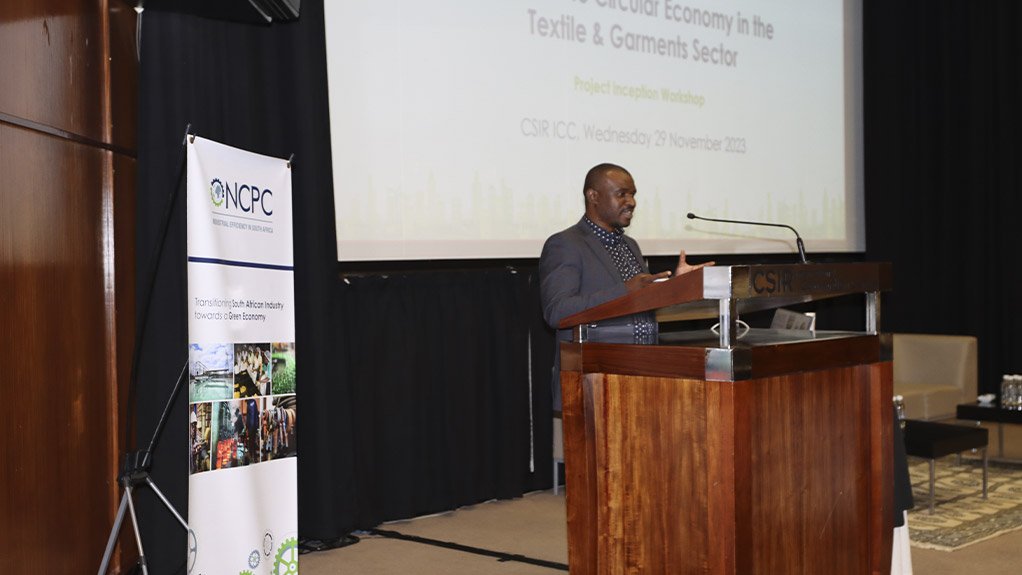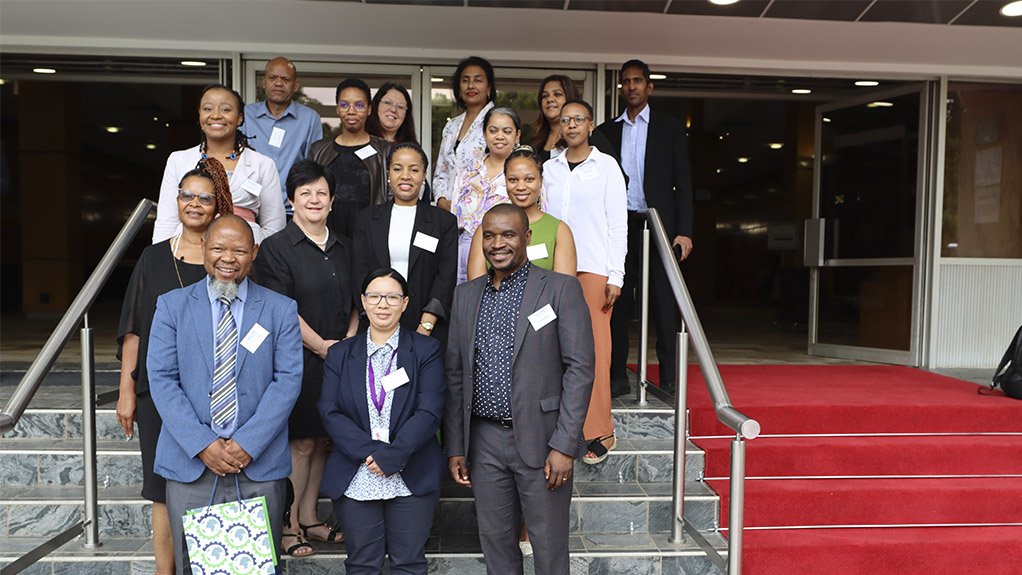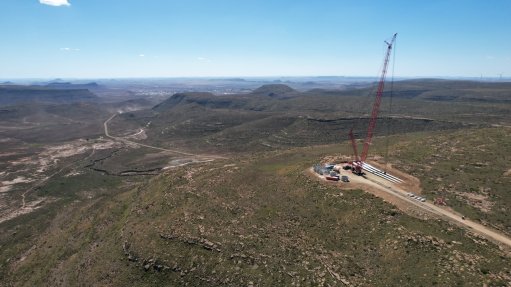Five-year multinational project kicks off to advance the circular economy in the textile industry
This article has been supplied as a media statement and is not written by Creamer Media. It may be available only for a limited time on this website.
“The World Bank estimates that nearly 20% of global wastewater comes from textiles,” said United Nations Industrial Development Organization Project Administrator, Franchesca Beru at an inception workshop for a five-year multinational project, titled Promotion of the circular economy in the textile and garment sector through the sustainable management of chemicals hosted by the National Cleaner Production Centre South Africa (NCPC-SA). The countries participating in the project are Lesotho, Madagascar and South Africa, with Ethiopia being a recent addition.
The application of circular economy principles promises great benefits for companies, the sector, and the country.
Speakers joining the discussions represented the Department of Trade, Industry and Competition (the dtic); the Department of Forestry, Fisheries and the Environment; the Council for Scientific and Industrial Research, which is also host to the NCPC-SA; the United Nations Industrial Development Organization (UNIDO), the project implementing partner; and the Zero Discharge of Hazardous Chemicals (ZDHC), a global body aiming to eliminate hazardous chemicals from the textile, apparel, and footwear industry. The Global Environmental Facility is the project funder.
“The workshop aimed to set the scene for the next five years. It was a platform for delegates to share knowledge, challenges and experiences around circularity in the textile and garment sector, with specific emphasis on chemical management and waste discards,” said Lesego Hlalethwa, the NCPC-SA workshop organiser and programme director.
The project will follow a value chain approach that, upstream, addresses the sector’s resource use, green and sustainable chemistry, and downstream, addresses the reuse, recycling and conversion of textile/garment discards and related wastes into economically viable and socially beneficial products and services.
Why does the project exist? Franchesca Beru explains, “There are a lot of hazardous chemicals in the value chain, including chemicals of concern and persistent organic pollutants. This presents an obstacle to recycling throughout the value chain because you cannot recycle these materials when they contain hazardous chemicals.
“Most of the off-cuts and textile discards end up in landfills. They are incinerated or burned in the open, and this means a lot of greenhouse gases are emitted and the energy used is usually fossil fuels. There's also the issue of wastewater that is produced from the textile value chain.
“Another reason, on the positive side, is that it also presents a business opportunity. A lot of brands are looking to source sustainable materials. That presents an opportunity for businesses who want to export or, talking about local content, brands might want to source recycled materials for their labels to say that it is sustainably sourced,” Beru continued.
She explained that the participating countries were selected based on their export contributions. “South Africa is a top 10 exporter of apparel as are Lesotho, Madagascar, and Ethiopia. We also based our selection on UNIDO’s previous experience in the countries. UNIDO has worked with South Africa and the other countries quite extensively on different projects. Regional integration was also a consideration,” she explained.
The project has been some time in the making as the Preparation Phase took place in 2021 and involved eight clothing and textile companies in KwaZulu-Natal, the Western Cape and the Eastern Cape. This period served to gather information from resource efficiency and cleaner production, best available technologies, and break-even point assessments; studies on gender; waste categorisations; and chemicals used, among others.
The participating countries face similar challenges concerning the continued use of hazardous chemicals in the value chains. This includes the release of chemicals during production, use and disposal, generation and disposal of wastes, offcuts and discards, and their impact on human health and the environment.
The reasons for these challenges vary from limited technical capacity and expertise, and limited coordination between local, regional and global initiatives, to a lack of an enabling environment which focuses on policy and regulation. The project aims to find solutions to these challenges.
International partners supporting the project include the Cambridge University Circular Economy Centre (CEC), the International Council for Local Environmental Initiatives (ICLEI) Africa, the Sustainable Fashion Academy (SFA), and the ZDHC. The CEC will help to develop new business models and financial systems to promote the circular economy, as well as capacity building in the form of training of trainers, developing tools, school curricula, and university research programmes.
SFA will also provide training-of-trainer services related to sustainable apparel, and it will develop toolkits and business cases for supply chain management. ICLEI Africa will offer services related to policy and legislation, and ZDHC will build capacity on good chemical management practices through training programmes.
“Well done to the NCPC-SA for being the first national executing entity to host an inception workshop,” Bera concluded. Priorities for the first two quarters of 2024 include national inception workshops like this one in the other countries, a regional inception workshop to be held in South Africa, training on circular economy principles by the CEC, reviewing the relevant existing legislation and regulations which will be followed by proposed revised legal frameworks, and collaboration between the ZDHC and beneficiaries for factory assessments.
Comments
Press Office
Announcements
What's On
Subscribe to improve your user experience...
Option 1 (equivalent of R125 a month):
Receive a weekly copy of Creamer Media's Engineering News & Mining Weekly magazine
(print copy for those in South Africa and e-magazine for those outside of South Africa)
Receive daily email newsletters
Access to full search results
Access archive of magazine back copies
Access to Projects in Progress
Access to ONE Research Report of your choice in PDF format
Option 2 (equivalent of R375 a month):
All benefits from Option 1
PLUS
Access to Creamer Media's Research Channel Africa for ALL Research Reports, in PDF format, on various industrial and mining sectors
including Electricity; Water; Energy Transition; Hydrogen; Roads, Rail and Ports; Coal; Gold; Platinum; Battery Metals; etc.
Already a subscriber?
Forgotten your password?
Receive weekly copy of Creamer Media's Engineering News & Mining Weekly magazine (print copy for those in South Africa and e-magazine for those outside of South Africa)
➕
Recieve daily email newsletters
➕
Access to full search results
➕
Access archive of magazine back copies
➕
Access to Projects in Progress
➕
Access to ONE Research Report of your choice in PDF format
RESEARCH CHANNEL AFRICA
R4500 (equivalent of R375 a month)
SUBSCRIBEAll benefits from Option 1
➕
Access to Creamer Media's Research Channel Africa for ALL Research Reports on various industrial and mining sectors, in PDF format, including on:
Electricity
➕
Water
➕
Energy Transition
➕
Hydrogen
➕
Roads, Rail and Ports
➕
Coal
➕
Gold
➕
Platinum
➕
Battery Metals
➕
etc.
Receive all benefits from Option 1 or Option 2 delivered to numerous people at your company
➕
Multiple User names and Passwords for simultaneous log-ins
➕
Intranet integration access to all in your organisation























